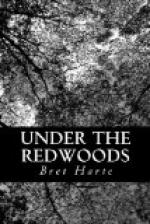a straggling beach of huts and stranded hulks, but
to the earlier stages of its development into the
metropolis of California. Its first tottering
steps in that direction were marked by a distinct gravity
and decorum. Even during the period when the
revolver settled small private difficulties, and Vigilance
Committees adjudicated larger public ones, an unmistakable
seriousness and respectability was the ruling sign
of its governing class. It was not improbable
that under the reign of the Committee the lawless
and vicious class were more appalled by the moral
spectacle of several thousand black-coated, serious-minded
business men in embattled procession than by mere
force of arms, and one “suspect”—a
prize-fighter—is known to have committed
suicide in his cell after confrontation with his grave
and passionless shopkeeping judges. Even that
peculiar quality of Californian humor which was apt
to mitigate the extravagances of the revolver and
the uncertainties of poker had no place in the decorous
and responsible utterance of San Francisco. The
press was sober, materialistic, practical—when
it was not severely admonitory of existing evil; the
few smaller papers that indulged in levity were considered
libelous and improper. Fancy was displaced by
heavy articles on the revenues of the State and inducements
to the investment of capital. Local news was
under an implied censorship which suppressed anything
that might tend to discourage timid or cautious capital.
Episodes of romantic lawlessness or pathetic incidents
of mining life were carefully edited—with
the comment that these things belonged to the past,
and that life and property were now “as safe
in San Francisco as in New York or London.”
Wonder-loving visitors in quest of scenes characteristic
of the civilization were coldly snubbed with this
assurance. Fires, floods, and even seismic convulsions
were subjected to a like grimly materialistic optimism.
I have a vivid recollection of a ponderous editorial
on one of the severer earthquakes, in which it was
asserted that only the unexpectedness of the
onset prevented San Francisco from meeting it in a
way that would be deterrent of all future attacks.
The unconsciousness of the humor was only equaled
by the gravity with which it was received by the whole
business community. Strangely enough, this grave
materialism flourished side by side with—and
was even sustained by—a narrow religious
strictness more characteristic of the Pilgrim Fathers
of a past century than the Western pioneers of the
present. San Francisco was early a city of churches
and church organizations to which the leading men
and merchants belonged. The lax Sundays of the
dying Spanish race seemed only to provoke a revival
of the rigors of the Puritan Sabbath. With the
Spaniard and his Sunday afternoon bullfight scarcely
an hour distant, the San Francisco pulpit thundered
against Sunday picnics. One of the popular preachers,
declaiming upon the practice of Sunday dinner-giving,
averred that when he saw a guest in his best Sunday
clothes standing shamelessly upon the doorstep of his
host, he felt like seizing him by the shoulder and
dragging him from that threshold of perdition.




